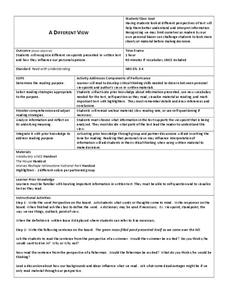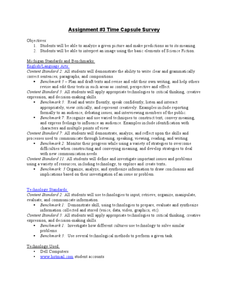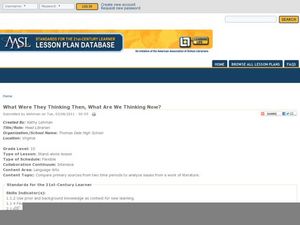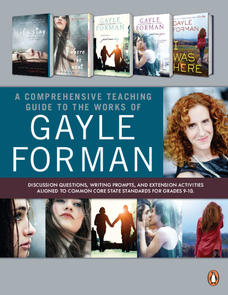Curated OER
Island Survival
Students participate in a simulation of life on a deserted island. They work with their group to develop an island survival plan and summarize it in a journal. Students use a worksheet and challenge cards to earn points. They will be...
Curated OER
MONSTERS AND MYTHS: SCRIPTS /SCULPTS
Seventh graders are introduced to myths formed by many cultures as a unique genre of literature. They use critical thinking skills to compare and contrast mythic tales, compare versions of the same story, and respond to literature in...
Curated OER
Land Surveys
Students read and think about the relationship between maps and nature. They examine the origins of the Land Ordinance of 1785 and the large-scale topographical surveys that were commissioned a century later. They also read and analyze...
Curated OER
A Different View
Readers need to understand how their personal view point may differ or change how they see the view point found in a written text. Third graders read two informational pieces and fill out a graphic organizer to help them differentiate...
Curated OER
Click, Clack, Moo: Electric Blanket Science
Students read Click, Clack, Moo: Cows That Type by Doreen Cronin and discuss the similarities and differences between electric blankets and regular blankets. They brainstorm a list of reasons why the farm animals wanted electric blankets.
Curated OER
An Indecent Chicken?
In this inference activity, students read a passage and write a conclusion about what they read and match vocabulary words with definitions. Students complete 11 problems.
Curated OER
Time Capsule Survey
Here's a fun way to incorporate technology into your curriculum. E-mail each of your class members a picture and 10 questions about the photo. Individuals then imagine the story behind the image and e-mail back their responses. Although...
Curated OER
What Were They Thinking Then, What Are We Thinking Now?
Choosing an issue from a play or novel, researchers find two primary sources from different time periods to compare how people's views have changed. Many questions are listed to guide young writers. In the end, learners produce a...
Penguin Books
An Educator’s Guide to Gayle Forman
Sometimes a novel is the best way to tackle a tough topic. A helpful educator's guide for the novels of Gayle Forman discuss tough topics such as teenage suicide. Discussion questions and writing activities encourage readers to think...
Curated OER
Brog-Cube-the Spam
A Middle school special ed class uses the acronym SPAM to learn the 4 parts of writing. They employ 4 different colors to help them visually distinguish each part of writing in a given prompt. This lesson is vague and uses a strong...
Curated OER
Paradise Lost: Anticipation Guide
To set the stage for reading Paradise Lost, class members compete an anticipation guide containing statements that connect to themes in Milton's epic poem.
Reed Novel Studies
The True Blue Scouts of Sugar Man Swamp: Novel Study
Wild feral hogs and an alligator wrestler are just two interesting aspects of Kathi Appelt's novel The True Blue Scouts of Sugar Man Swamp. Using the novel study, scholars search the text for examples of the eight parts of speech....
Reed Novel Studies
Treasure Island: Novel Study
Pirates ahoy! Readers go on an adventure using a novel study for Treasure Island as they research and write about a modern-day pirate story. Additionally, scholars practice writing similes and alliteration before answering comprehension...
Reed Novel Studies
Three Times Lucky: Novel Study
A car crash, a murder, a hurricane. With such a plot, why is the title of Sheila Turnage's novel Three Times Lucky? After making a prediction about the plot, scholars use the novel study to research and record facts about the United...
Reed Novel Studies
The Tiger Rising: Novel Study
Tiger, puma, lynx, jackal: which does not belong? Using the novel study for The Tiger Rising by Kate DiCamillo, scholars complete a similar vocabulary exercise. Next, they write sentences explaining why their chosen words don't fit. They...
Reed Novel Studies
Tales of a Fourth Grade Nothing: Novel Study
Many turtle species can retreat their heads into their shells when threatened by predators. With the Tales of a Fourth Grade Nothing novel study, pupils conduct research to uncover other interesting turtle facts. As they explore Judy...
Joel Michel Studies
The Swiss Family Robinson: Novel Study
What items would most people want to have with them if they were stranded on a desert island? Using the novel study for The Swiss Family Robinson, scholars attempt to answer the question from their own perspectives. They also explore...
Education Bureau of Hong Kong
Evaluating Casual Claims
Responsible decision making relies on the ability to a recognize, analyze, and evaluate claims. The worksheets and activities in this 32-page packet teach learners how to distinguish among opinions, reasoned arguments, facts, and logical...
Brigham Young University
A River Runs Through It: Blooms Taxonomy
Designed for teachers who use Norman Maclean's autobiographical A River Runs Through It, this one-page resource offers discussion question structured using Bloom's Taxonomy.
Curated OER
The Old Man and the Sea: Vocabulary Strategy
Readers read more closely when they think critically about a text. Discuss the words and concepts from Ernest Hemingway's The Old Man and the Sea with a class activity that asks readers to not only record unfamiliar words they find in...
For the Teachers
Story Strips Sequencing
What happens next? Work on story sequence with a lesson that prompts kids to put a story back in order. Additionally, they discuss what would happen if one event was missing from the sequence.
Montclair Art Museum
Eric Carle: Animals and Friends
Celebrate Eric Carle’s beloved children’s books, especially those about animals. Teachers and readers alike engage in Carle’s books as they explore the art and color in each of his stories, and how these elements support comprehension.
Council for Economic Education
What's the Big Deal about Spices?
Today's gourmands don't consider spices to be the equivalent of silver and gold. During the middle ages, however, these commodities were precious. People back then used spices in religious ceremonies, to cure rotten food, and as a show...
K12 Reader
Proverbs and Adages: What Do They Mean?
You shouldn't judge a book by its cover, but feel free to find the silver lining in a learning exercise about common proverbs and adages. Learners read six popular adages and write their literal definitions on the lines provided.




















